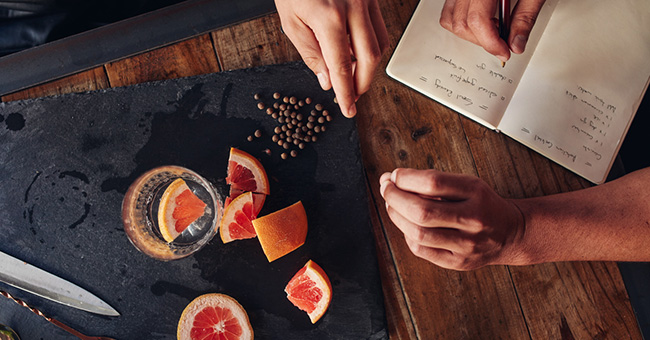Glance through any bookstore and you’ll see a generous selection of shiny new cocktail books. It might seem like everyone is releasing one, but if you want to sell your own, it can be hard to figure out where to begin. We caught up with several bartenders who became authors, and one of the literary agents who helps them get there, to demystify the process and help you decide if you’re ready to enter the publishing arena.
Cultivate your network
Tristan Stephenson, author of the “Curious Bartender” series of books, had recently won a bartending competition when he got a call from a publisher wondering if he was interested in writing a book for them. The catch? They wanted a book about jelly cocktails. He scheduled a meeting at his bar. “When they turned up I said, ‘Cards on the table, I don’t have any intention of writing a book about jelly shots. I can imagine this book being in the bargain bin in about six months and any credibility that I had at that point completely shattered,’” Stephenson said. So, he boldly offered a counterproposal. “I said, ‘This is the book I would like to write,’ and I gave them a proposal on a cocktail book idea which eventually became my first book.” The publisher bought the idea. The fifth book in the Curious Bartender series releases this spring.
While the cocktail competition didn’t hurt, Stephenson was recommended to the publisher by a colleague, one who didn’t think he was likely to write about the suggested topic. Although it was meant as a joke, it kicked off a whole new phase of his career. You never know who might be integral to a publishing opportunity.
Beyond getting a book deal, your connections will also help you sell your books. It’s important to be able to present a publisher with a clear marketing plan, says Marilyn Allen, a literary agent with Allen O’Shea Literary Agency (responsible for selling “The Dead Rabbit Drink Manual” to a publisher, among others). “I would say if they think they can sell ten thousand copies, I think they have a pretty good vision of how to get a book launched,” she says.
Be proficient (and passionate)
Julie Reiner, author of “The Craft Cocktail Party: Delicious Drinks for Every Occasion” and co-owner of Clover Club and Leyenda, wasn’t looking for a book deal when Jonah Straus, the agent who sold books such as “Death & Co: Modern Classic Cocktails” and “Smuggler’s Cove”, sought her out to suggest that she write a book. Immediately, the wheels started turning. “The inspiration for the book really came from the emails and the phone calls that I get non-stop from my mom and my sister-in-law and various family members saying: ‘What should I make for Thanksgiving? I have 20 people coming over.’”
Although it might seem like her book deal came easily, it was based on a foundation of hard work over the course of her career. “You need to create a reputation for yourself,” says Reiner. “Look at somebody like Martin Cate, he opened a very successful, highly acclaimed tiki bar and really made a name for himself before he shopped the book. At that point in his career, he had all of these tiki recipes and knew a ton about the category and the genre of tiki.” She cautions would-be authors to be honest with themselves about what they have to offer. “Cocktail books historically don’t do all that well. There’s a lot of them on the shelves, and there’s a lot of them by people who aren’t bar people at all. Make sure that you have something to say, know what you want to put out there, have a really good idea, and give it a personal touch, otherwise it’s just a book of recipes.”
Jules Aron, bartender, consultant and author of “Zen and Tonic: Savory and Fresh Cocktails for the Enlightened Drinker” wasn’t a particularly well-known bartender when she landed her book deal, although she’d been bartending for about fifteen years. She was passionate about health and mixology and found a way to combine the two in her cocktail book. She recommends that bartenders hoping to be authors don’t choose a topic lightly, because you’re stuck with it for the long haul. “They need to be extremely passionate about what they want to write about because there is so much work involved,” says Aron. “If you’re not completely invested in your idea, I would say, wait until you are, because there’s just so many roadblocks and difficulties involved.”
Seek the unique
Most books start with a proposal. According to Allen, it’s essentially a marketing plan, a synopsis of your idea and a bit of a bio. “You want to have a competitive analysis,” she says. “What are the books in the marketplace that are like yours, and which ones are different? I think a key thing to do is to be sure you are writing something new. You don’t want to do just another generic cocktail book. You want to do some real research on Amazon and in the book stores to be sure that your idea is new.”
“There are so many cocktail books out there, and unless you’re very well known you really have to bring something unique to the table,” says Aron. “Just find your unique spin on cocktails and really be passionate about it and then go for it. It’s all very possible if you’re fully in it.”
Sacrifice sleep
Once you’ve secured a contract, you’ll have to actually find time to write the book. According to Stephenson, if you want to get it done, something’s got to give. “You think, right, writing a book, say, three hours a day for a year, pretty much every day, maybe a thousand hours. For a lot of people it’s just unfeasible to find a thousand hours to assign to writing, but if you’re going to write a book, you’ve got to find it from somewhere, either you get less sleep or you take it away from your down time. It has to be sacrificed from somewhere,” he says. “I find it best to just take a little bit of it out every single day rather than saying I’m going to write all day on Saturday, for example, because chances are it’s not going to be your best work if you’re trying to write solid for nine or 10 hours.”
Aron worked two bartending jobs while writing her book. “I spent my days writing and bartending at night,” she says. “I couldn’t write during the weekends because I was doing doubles.” During the week, she wrote about four hours a day, before she went to work.
“I spent a lot less time on the floor and at the bar when I wrote the book,” says Reiner. By that time, she wasn’t doing regular bar shifts anymore, but she was in the midst of opening Leyenda (it opened the same day the book released). “It was me going in really early and sitting at Clover Club, working on the book during the day before people came in. It took longer because I had another job to do at the same time. It’s a juggling act.”
Aron notes that the work isn’t finished once the writing is done. “It doesn’t stop with writing the book. I think maybe the biggest part of writing a book happens once the book is written and you have to promote it,” she says.
Don’t be afraid to ask for help
Although it’s certainly possible to sell a book on your own, having an agent can take some of the pressure off. “I think that most would benefit from working with an agent because they’re really your partner,” says Allen. “We can show you how to strengthen a book proposal and make it more attractive to a publisher, we help authors negotiate.” If you do decide to seek an agent, it’s important to find the right fit. It should feel like a true partnership.
Stephenson had done some some writing for industry publications and Aron had originally intended to make a career in magazine publishing, but not every bartender has a writing background. Many cocktail books are written with the help of professional writers. Reiner interviewed several writers before she settled on Kaitlyn Goalen. “Kaitlyn really gets me. I wanted to make sure that it was my voice, so I would write things and send them to her and then she would edit and make the language more flowery and send it back. I had a great experience working with her, more than anything she just helped me to be organized. My life has been the controlled chaos of running bars and being on the floor, it’s different everyday. Writing that book was probably the hardest thing I’ve ever done in my whole career because it’s sitting at a desk by yourself. I wanted to poke my eyes out so many times.”
“Some of my clients hire professional writers,” says Allen. “I find it’s rare that a bartender can do it alone, they need a partner usually, or a co-writer. Those deals can take all sorts of shapes.”
Stephenson swears by his software. “The software that I use is called Scrivener. It’s in the best piece of software I’ve used for any application. It’s great for compiling notes or writing synopses of chapters. It’s fantastic for scheduling your writing, you can set target word counts and deadline dates and it’ll tell you how many words you need to write a day.”
The finished product
Though it’s a lot of hard work, there is a thriving market for cocktail books. “This category tends to still sell very well in physical books, they sell in bookstores, they sell in gift shops, food stores, even Urban Outfitters,” says Allen. “There’s a wide breadth of marketing opportunities.”
Reflecting on her publishing journey, Reiner has no regrets. “I’m so happy that I did it and that I have this book and it has my name on it,” she says. “But it was hard.” Publishing a book is nothing to pursue lightly, but for the right person, with the right idea, the payoff can be worth the difficulties of the process.




